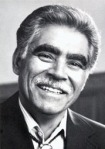The Hispanic Reader is two years today! And with our last post, a review of Javier Mácias’ The Infatuations, this blog has marked another milestone – 75 book reviews. Let’s look at these books:
- 53: Novels
- 6: Memoirs, including My Beloved World by Sonia Sotomayor
- 5: Short story collections
- 4: Essay collections
- 4: Non-Fiction
- 3: Graphic books/Picture books
- 38: Female
- 37: Male, including Carlos Fuentes, author of The Death of Artemio Cruz
Settings of book:
- 53: United States
- 13: Mexico
- 5: Spain
- 5: Dominican Republic
 4: Chile, including The Neruda Case by Roberto Ampuero
4: Chile, including The Neruda Case by Roberto Ampuero- 4: Other
- 3: Argentina
- 3: Cuba
- 1: Panama
- 1: Colombia
Note: Some books take place in more than one country. (And, in case you’re wondering, I kept a spreadsheet of these details.)
 First book reviewed: Say Her Name by Francisco Goldman
First book reviewed: Say Her Name by Francisco Goldman
Shortest book: Have You Seen Marie? by Sandra Cisneros, 112 pages, much of which were illustrations
Longest book: The Time in Between by Maria Duenas, 624 pages
 Number of contemporary books (released during the blog’s existence): 58
Number of contemporary books (released during the blog’s existence): 58
Number of classic books (released before the blog’s existence): 17
Oldest Book: The Aleph by Jorge Luis Borges, released in 1949
Favorite title: Yaqui Delgado Wants to Kick Your Ass by Meg Medina
Yaqui Delgado Wants to Kick Your Ass by Meg Medina
Favorite ending: When I Was Puerto Rican by Esmeralda Santiago
Favorite book: The Hummingbird’s Daughter by Luis Alberto Urrea
Best passages:
From The Hummingbird’s Daughter by Luis Alberto Urrea
“If you are too blind to see God in a Goddamned taco … then you are truly blind.”
From Loving Pedro Infante by Denise Chávez
“There’s nothing a Mejicano or Mejicana loves more than the burning, stinging pain of thwarted, frustrated, hopeless, soulful, take-it-to-the-grave love. Nothing gets us going more than what I call rabia/love of the te-juro-you’re-going-to-pay-for-all-the-suffering-you-caused-me variety.”
From The Brief Wondrous Life of Oscar Wao by Junot Díaz
“I kept waiting to run into my family posting up flyers of me on the boardwalk … but the closest I came to any of that was someone had put up for a cat they lost. That’s white people for you. They lost a cat and it’s an all-points bulletin, but we Dominicans, we lost a daughter and we might not even cancel our appointment at the salon.”

























